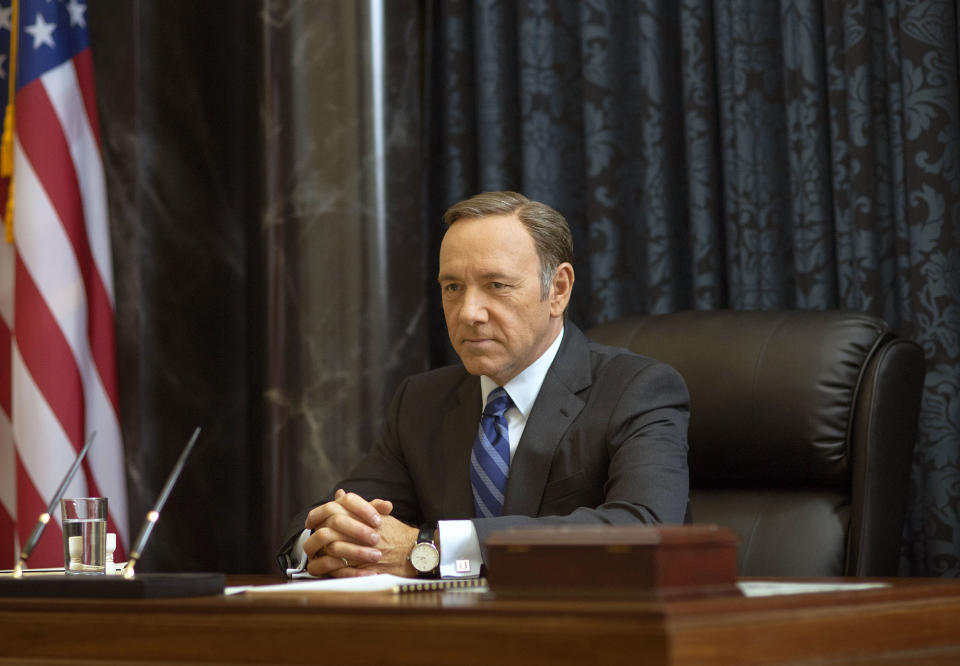Why the fake president on 'House of Cards' is better than the real one
Frank Underwood, the fictional president played by Kevin Spacey on the Netflix series "House of Cards," is a murderous villain who’s more Machiavellian than any real president in recent history.
He’s also a model of political courage, compared with modern politicians.
In season 3, in the midst of a recession, with unemployment soaring and his approval rating sinking, Underwood goes on TV to tell the American people this:
The American Dream has failed you. Work hard. Play by the rules. You aren’t guaranteed success. Your children will not have a better life than you did…. We’ve been crippled by Social Security. By Medicare. Medicaid. Welfare. And entitlements. And that is the root of the problem. Entitlements. Let me be clear: You are entitled to nothing. You. Are entitled. To nothing.
Underwood goes on to explain, somewhat ham-handedly, that he can reveal this awful truth because he has decided not to run for re-election, and therefore doesn’t need to pander to voters with syrupy lies. Knowing the nefarious Frank, he’s probably got something more sinister in mind. Yet Spacey and the show's observant writers have nonetheless fingered what is perhaps the most egregious failure of government today: Politicians continually promising more than Washington is ever going to deliver.

This matters more than it used to because our economic problems are more pernicious now than they were in the 20th century. Even in the midst of an impressive job-market recovery, incomes remain depressed, since a lot of new jobs pay less than jobs lost during the last decade. Income inequality is near record levels, with the rich getting richer and the rest falling behind. The American middle class literally seems to be shrinking, and Washington’s massive debt load means the government is more likely to cut aid to those who need it than to offer more help.
Virtually everybody in Washington—no matter which political party—agrees that government spending on Social Security, Medicare and other entitlements will have to be curtailed as the U.S. population ages and such spending gobbles up an increasing portion of the federal budget. But try finding a politician who will say that publicly.
President Obama nibbled at the theme of “personal responsibility” in both inaugural speeches (in 2009 and 2013), but he also clearly believes Americans are entitled to a lot more than nothing. Obama routinely touts proposals to hike the minimum wage, use government funds for job training and boost tax credits for lower-income workers. In this year’s State of the Union address, for instance, Obama said:
We need to set our sights higher than just making sure government doesn’t screw things up; that government doesn’t halt the progress we’re making. We need to do more than just do no harm. Tonight, together, let’s do more to restore the link between hard work and growing opportunity for every American.
Republicans are more willing to talk about cutting entitlements, but even their statements are extremely circumspect, lest they alarm voter royalty: senior citizens. Senate Majority Leader Mitch McConnell of Kentucky, for instance, once favored privatizing Social Security and Medicare — which could cut funding levels, leading to a political uproar -- but he has since softened his positions and largely dodged the whole issue while running for re-election last year. Ted Cruz, considered the most daring (or reckless) Republican senator, wants to gut the Affordable Care Act, like many Republicans, but his position on Medicare and Social Security is simply to raise eligibility ages gradually, to make both programs more financially secure. Cruz, too, seems to believe you are entitled to something, and something quite costly at that.
The fictional President Underwood’s truth-telling on entitlements is part of a scheme to pass another big government plan, called America Works, to help put 10 million unemployed Americans back to work. It will cost $500 billion, and the money has to come from somewhere, which is why Underwood targets entitlements — perhaps the only place in the budget, other than defense, where you could come up with such a large sum. As a serious policy proposal, Underwood’s jobs plan fails the sniff test imposed by real-world policy analysts. But the magnitude of the budgetary tradeoffs is in the ballpark, given that entitlements cost about $1.6 trillion per year, nearly half of all federal spending. And the cost is going nowhere but up.
Do Americans need a president willing to tell them the jig is up and government can’t do any more for them? Arguably, yes. The biggest problem facing the middle class is an economic transformation driven by fast-paced digital technology that is making millions of jobs obsolete. The government, which is years behind the private sector to start with, may actually be the worst institution for helping ordinary Americans react faster to changes that are already outpacing them. Plus, the big entitlement programs will have to be cut before long, unless the American workers who fund them are willing to tolerate major tax increases. (Fat chance.)
Americans are obviously entitled to something -- they pay about $3 trillion worth of taxes each year. But for the last 15 years, taxpayers have been getting far more than they pay for, with the government making up the difference by borrowing money future taxpayers will have to pay back at some point. A lot of money. Honest politicians ought to curse this Faustian and tell voters they need to expect less from Uncle Sam. At least a fictional president is willing to put us on notice.
Rick Newman’s latest book is Liberty for All: A Manifesto for Reclaiming Financial and Political Freedom. Follow him on Twitter: @rickjnewman.

